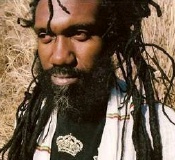Corey Harris explores the Crossroads of music, history, politics and spirituality
MIAMI – In a career that spans more than a decade, Corey Harris has dug into the roots of African-American music perhaps more deeply than any of his predecessors. More than just a songwriter and musician, he is also a pilgrim in search of the music’s earliest origins, beyond the Mississippi delta to the continent of Africa and the three-thousand-year-old underpinnings of contemporary culture.
The culmination of this journey is Zion Crossroads, Harris’ debut recording on Telarc. Inspired and informed by his travels to various parts of Africa over the past decade, the album captures some of the most enduring elements of African-American music – blues, reggae, soul and so much more – and infuses them with a sense of history, social consciousness and spirituality.
Telarc debut scheduled for release on July 24, 2007
“I wanted to make a record that was all roots-oriented,” says Harris. “I wanted to do a record that blended all of my influences, but that was all original at the same time. So in that sense, there were two sides to this project. There were the lyrics and the concepts and the songwriting, and then there was the music of it all too. That’s why I called it Zion Crossroads. It’s a spiritual record, but at the same time, it’s talking about the crossroads – not just the crossroads that we all understand in the blues context, but in all the meanings of that word.”
The overall tone of the record is in many ways set by the opening track, “Ark of the Covenant.” The song celebrates the long and mysterious history of the Old Testament vessel that held the stone tablets containing the Ten Commandments as handed down to Moses by God on Mount Sinai and delivered to the Israelites. According to Ethiopian tradition, the Ark of the Covenant rests in the holy city of Axum, in northern Ethiopia – a country that was formerly an Israelite nation before its conversion to Christianity in the third century A.D.

Corey Harris
The Ark and its history are the lynchpin that binds the diverse themes of reggae music, Ethiopian culture and Old Testament law. “When you see people who are into Haile Selassie I [ruler of Ethiopia from 1930 to 1974], they’re often listening to reggae,” Harris notes. “They’re often very informed about the Bible. They’re often very knowledgeable about Africa and Ethiopia. They may be from any persuasion, from any culture on the planet. It’s a movement. But at the same time, this is more than just a reggae record…Whenever I make a record, I try to speak to everyone and make it as international as I can.”
Other noteworthy offerings from Zion Crossroads include “Heathen Rage,” a song that Harris co-wrote with drummer Keith Brown during a trip to Ethiopia in September 2006. The song urges a sense of unity among people of color in a world plagued by despair and disharmony. On a more overtly political front, “Sweatshop” is a commentary on the cheap labor in remote parts of the world that produces clothing that is often taken for granted by consumers in the West.
“If you look at the tag on your garment, then you know why you got such a good deal,” says Harris. “If it had been made in your hometown, you wouldn’t be able to afford it. The parts of the world that thrive do so because other parts of the world suffer. This song is about more than just clothing. It’s about where the wealth in our economy comes from.”
“In the Morning” is a song of thanks that Harris and his band have been performing in their live shows for a while. “It’s just a song about getting up early and giving thanks,” says Harris. “It talks about the fishermen who have to get up early to make their catch. It’s the same for all of us. We have to get up early and have our nets ready and be prepared to do whatever good works we hope to do on any given day.”
“Walter Rodney” is an ode to Guyanese historian, writer and revolutionary who was assassinated for his beliefs. “He championed the rights of workers, the poor and the oppressed,” says Harris. “He was really, truly a servant of the people.”
In the final stretch, the poignant island-flavored ballad “You Never Know” veers away from politics and tells a more personal tale of love and devotion, while reggae-gospel hybrid closer, “Keep Your Culture,” encourages black people everywhere to stay connected to their roots, lest they lose their collective sense of cultural and spiritual identity.
Harris gets help on the path to Zion Crossroads from producer Michael G, the guitarist and co-founder of Easy Star All-Stars, the New York-based reggae collective that crafted Dub Side of the Moon (2003) and Radiodread (2006). Like Harris, he sees the project as a powerful convergence of style, vision, history and culture: “The marriage of Corey’s socially conscious lyrics and the revolutionary sounds of reggae make for a potent musical cocktail that arouses the body, mind, and spirit.”
Zion Crossroads is a rich tapestry of thematic layers – on one hand diverse, yet all part of an unmistakable and fascinating whole. “I just have to be true to where I am and what I’m doing at all times,” says Harris. “It was just time for me to do this, because I’d been edging toward different styles and edging toward something like this in my records for more than a decade. I’ve never been content to do the same thing over and over again.”




